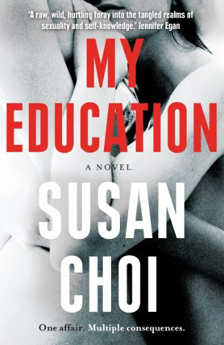Make way for the good stuff
by Susan ChoiSusan Choi is the author of the novels The Foreign Student (1998), recipient of the Asian-American Literary Award; American Woman (2003), a finalist for the 2004 Pulitzer Prize; A Person of Interest (2008), a finalist for the 2009 PEN/Faulkner Award; and most recently My Education (2013). A recipient of fellowships from the Guggenheim Foundation and the National Endowment for the Arts, she lives in Brooklyn with her husband and sons. Here are her seven golden rules to keep in mind when writing long-form fiction.
1. Write daily
If only I could manage to do this myself! The object isn’t quantity, it’s quality: when you write daily, you get more of that inevitable bad writing out of the way, and make way for the good stuff. When you write daily, your continuous engagement with your writing makes the good stuff even better. Writing is an endless set of problems: when you write daily, you solve those problems faster. Even if it’s just for twenty minutes a day, like that cardiovascular exercise you’re also supposed to be doing, it’s better to write daily, for a short time, than to write for hours on end once in a while.
2. Write for the trash heap
This isn’t to say write garbage. Rather, know that you will write garbage, because everyone does, and be okay with throwing it out. Let your foremost thought be, “If it’s awful, I’ll chuck it.” Being all right with throwing things out will lead the way to better writing every time.
3. Write for yourself
This isn’t quite the same concept as ‘write for the trash heap’, but it’s close. Do not write for publication. Do not write for fame. Do not write for money. If those things are your strongest motivation, not only will you be disappointed, you will never write as well as you can. Even worse, you won’t enjoy yourself. Ideally, writing should be the thing you’d be happy to do if marooned on a desert island, alone, with no chance of rescue. It should be your private satisfaction, your companion. And if it leads to publication, and money, and fame? So much the better.
4. Write in page order
Now, this is a weird one, but I’ve come to believe in it. I wrote my first two books out of order, patchwork-style, never having any idea where I was, and it was a mess. With my next, most recent two, I wrote from page one. It was a magical experience. I had to go back and revise like crazy – in one of my books I decided against the existence of a major character when close to the end, and had to go back and strip her out wherever she appeared, like stripping out the ugly panelling in one’s basement – but I still believe that writing in page order is the way to go. You’re driving through fog – you should at least stick to one direction.
5. Write what obsesses you
If you’re like me, you’ll be stuck with your work a long time before it’s finished. Better not to get bored with it.
6. Write funny
Maybe not all the time, but sometimes at least. So few writers ever do – you’ll be doing the reading world a public service. Whatever you do, don’t write self-seriously.
7. Write humbly
See above.
My Education is a coming-of-age novel with a delicious cautionary twist – an intoxicating story of erotic obsession about a student who falls under the spell of her seductive English professor and his charismatic, volatile wife. It is published in the UK by Short Books.
“A raw, wild, hurtling foray into the tangled realms of sexuality and self-knowledge.”
Jennifer Egan, author of A Visit from the Goon Squad



